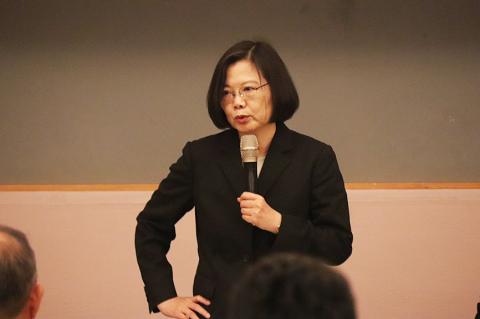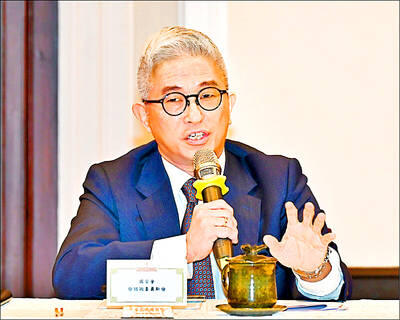Chinese nationalists who have advocated for the use of military force against Taiwan should be barred from entering the nation when necessary, President Tsai Ing-wen (蔡英文) said yesterday.
Those who have promoted applying China’s “one country, two systems” framework to Taiwan or have called for China to intimidate Taiwanese should also be barred from entry when necessary, Tsai said after meeting with Ministry of National Defense and Mainland Affairs Council (MAC) officials at a routine national security meeting.
The instruction followed the deportation last week of Chinese academic Li Yi (李毅), who was scheduled to speak at a pro-unification seminar held by the Chinese Unity Promotion Party (CUPP).

Photo: Lin Ching-lun, Taipei Times
Li had previously advocated for Chinese military action to force Taiwan’s unification with China.
Local media last week reported that members of a group advocating Chinese military action to annex Taiwan were planning to visit the nation and take part in political activities later this month.
The group was reportedly to include the head of the Beijing-based Modern Think-tank Forum, Li Su (李肅); US-based Chinese democracy advocate Wang Xizhe (王希哲); US-based China studies academics Feng Shengping (馮勝平) and Guo Yanhua (郭岩華); and Li Yi.
Reports said that the group was planning to hold seminars on unification with CUPP members and other unification advocates.
The MAC on Tuesday said in a statement that it would sometimes be necessary to bar entry into Taiwan of those who advocate the “one country, two systems” framework or a Chinese People’s Liberation Army attack on the nation, or who would otherwise cause social instability or threaten national security.
“We do not welcome those who do not respect mainstream public opinion in Taiwan, and who would come to Taiwan to push Chinese President Xi Jinping’s (習近平) ‘five points’ or applying the ‘one country, two systems’ framework to Taiwan,” the council said, adding that the government would be strict in dealing with those who advocate military action against Taiwan.
It is also strongly against those who come to Taiwan to promote pro-unification activities that jeopardize national security and social stability, the council said.
The MAC also warned Taiwanese against promoting Chinese military action against the nation, and advised them to have the nation’s best interests in mind.
Taiwan is a nation with freedom, democracy and the rule of law, and the Constitution guarantees freedom of speech, but advocating war and promoting forceful unification violate the universal value of peace, as well as civil and political rights, it added.
The MAC also reminded certain groups in Taiwan to respect national interests and not take part in or organize activities that promote unification by force.
Everyone should work together to help defend the nation’s sovereignty and democratic way of life, it said.
Additional reporting by CNA

A car bomb killed a senior Russian general in southern Moscow yesterday morning, the latest high-profile army figure to be blown up in a blast that came just hours after Russian and Ukrainian delegates held separate talks in Miami on a plan to end the war. Kyiv has not commented on the incident, but Russian investigators said they were probing whether the blast was “linked” to “Ukrainian special forces.” The attack was similar to other assassinations of generals and pro-war figures that have either been claimed, or are widely believed to have been orchestrated, by Ukraine. Russian Lieutenant General Fanil Sarvarov, 56, head

SAFETY FIRST: Double the number of police were deployed at the Taipei Marathon, while other cities released plans to bolster public event safety Authorities across Taiwan have stepped up security measures ahead of Christmas and New Year events, following a knife and smoke bomb attack in Taipei on Friday that left four people dead and 11 injured. In a bid to prevent potential copycat incidents, police deployments have been expanded for large gatherings, transport hubs, and other crowded public spaces, according to official statements from police and city authorities. Taipei Mayor Chiang Wan-an (蔣萬安) said the city has “comprehensively raised security readiness” in crowded areas, increased police deployments with armed officers, and intensified patrols during weekends and nighttime hours. For large-scale events, security checkpoints and explosives

‘POLITICAL GAME’: DPP lawmakers said the motion would not meet the legislative threshold needed, and accused the KMT and the TPP of trivializing the Constitution The Legislative Yuan yesterday approved a motion to initiate impeachment proceedings against President William Lai (賴清德), saying he had undermined Taiwan’s constitutional order and democracy. The motion was approved 61-50 by lawmakers from the main opposition Chinese Nationalist Party (KMT) and the smaller Taiwan People’s Party (TPP), who together hold a legislative majority. Under the motion, a roll call vote for impeachment would be held on May 19 next year, after various hearings are held and Lai is given the chance to defend himself. The move came after Lai on Monday last week did not promulgate an amendment passed by the legislature that

PENTAGON ASSESSMENT: A US report said that even as China and Russia deepen their partnership, cooperation is hindered by a ‘mutual distrust’ of each other The Chinese People’s Liberation Army (PLA) as of October had doubled the number of ships and airplanes deployed around Taiwan compared with the previous two years, Vice Minister of National Defense Hsu Szu-chien (徐斯儉) said yesterday, a day after the opposition-controlled legislature voted against reviewing the government’s general budget for next year, including a NT$1.25 trillion (US$39.71 billion) special defense spending bill. The legislature’s vote against the Ministry of National Defense’s spending plans was regrettable, as the budget was designed to respond to the developing Chinese military threat, Hsu said on the sidelines of a legislative meeting on the general budget. Defense